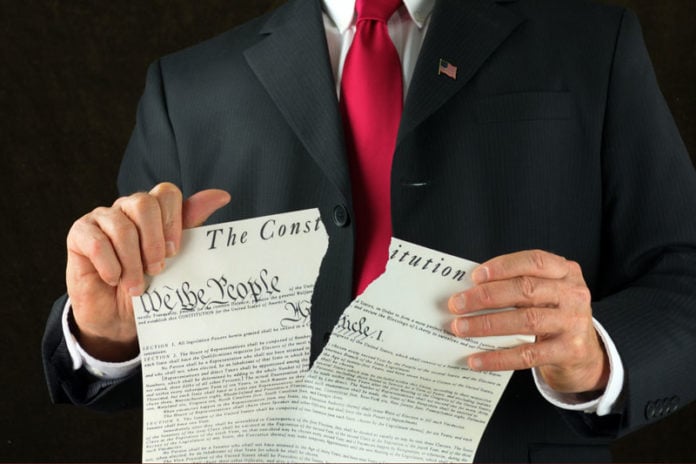On a daily basis, government officials at all levels make decisions and take steps that are, to put it mildly, without basis in our Constitution, or are in direct contravention of that magnificent document. As bad as these actions are, most citizens do not consider them fundamental or flagrant abuses of the Constitution (though they should). Most Americans still believe that the government operates in their best interests and according to the terms of the Constitution.
The government likes it that way. But, as we have seen just recently, it is merely a lack of opportunity, not desire, holding government back. Unfortunately, such opportunities are always one “emergency” away.
In advance of Hurricane Irma, U.S. Virgin Islands Gov. Kenneth Mapp issued an order that the territory’s National Guard is “authorized and directed to seize arms, ammunitions, explosives, incendiary material and any other property that may be required by the military forces” (emphasis added). Presumably, the edict was predicated on the need to maintain order and safety of USVI citizens within lawful bounds. But that is not what it said.
The shocking order was reminiscent of one issued in 2005 by New Orleans officials in the days following Hurricane Katrina, confiscating private firearms from citizens (in many instances, forcibly) who remained in their homes to protect themselves and their property from looters. “No one will be able to be armed,” New Orleans Police Chief Edwin Compass told the Washington Post at the time. “Guns will be taken. Only law enforcement will be allowed to have guns.”
Once the order became public, the governor tried to backtrack on his brazen edict, claiming weakly that — despite the clear and unambiguous wording of the document — it was meant only to enable the National Guard to purchase items it needed, not “seize” them from private citizens. But words do matter, and once a door is opened, the government sooner or later is always going to go through it. Precedent has been set.
This is precisely why legislation quietly passed by the U.S. Congress and signed by President Trump just weeks ago, is cause for similar concern. House Joint Resolution 76, a bill creating a tri-state Washington Metrorail Safety Commission for the D.C.-area did not raise any eyebrows at the time it was presented to Congress. However, buried within the text of the bill is a provision that grants virtually unlimited power to Metro authorities to enter and inspect any private property “near” the area’s Rail System at any time, without warrant or consent. Given both the size of the D.C. Metro system, and government’s penchant for skirting the Fourth Amendment (here, here, here, here, here), the implications are clear — if you live or have a business near a Metro stop, you have no Fourth Amendment protection against police coming into your home or business whenever they feel the need.
If an observer were cynical, he would conclude with a high degree of likelihood that the vast majority of those who voted “aye” did so because they did not even take the time to learn the provision was in the legislation. What is even more frightening, however, is the possibility that many of these elected officials consciously voted to strip thousands of citizens of metro D.C. of their right to be free from unreasonable government searches, simply because they were convinced by the measure’s proponents that the power was essential to guard against possible terrorist attacks.
We truly have reached the point at which fear — whether from a natural or man-made source — now officially trumps the Bill of Rights; even if that fear is only hypothetical or illusory.






























